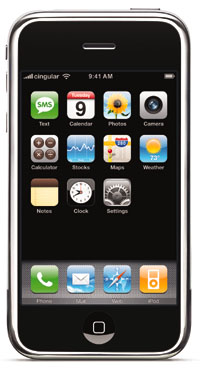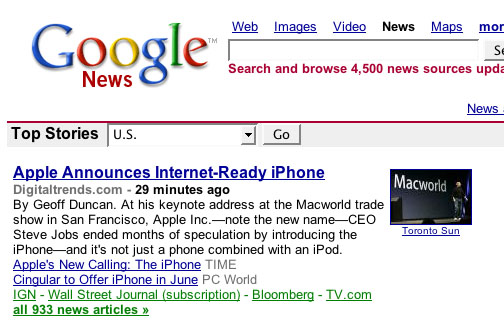Please Hold for the Apple iPhone
All the pundits are weighing in, so I'd be remiss not to make mention: Apple introduced its iPhone today. Although it won't be available to U.S. consumers until June 2007 (and not until the end of 2007 in Europe and 2008 in Asia), Apple's celebrity CEO Steve Jobs put an end to years of speculation by giving attendees an extended tour of the new device during his keynote address to this year's Macworld Expo in San Francisco.
The specs and capabilities of the iPhone are well documented elsewhere—including Apple's own site which includes interactive tours of the device's features and interface—and evaluated by folks who've actually set hands on the device. In short, the iPhone combines the capability of a so-called smartphone with a widescreen iPod and a full-featured wireless Internet device, and endeavors to make the device even more useful my leveraging these capabilities off each other: for instance, users could surf the Web while talking on the phone or listen to music while writing email. If you receive a call while listening to music, the iPhone gracefully fades the music and asks if you'd like to take the call. The iPod sports a few dedicated controls—a sleep/wake button, volume controls, an iPod connector—but most of the phone's interface and controls will be presented on the (large) touch sensitive screen. Need to dial a number? A numeric keypad appears? Need to type a message or enter search terms? Ditto for a QWERTY keypad.
Apple's exclusive partner for the iPhone in the U.S. is Cingular, and the two have collaborated on the iPhone's telephone functionality to offer some interesting features, like Visual Voicemail, which offers on-screen, list-based access to voice mail messages (a friend has called this the iPhone's "killer app.") It also offers an iChat-like balloon-conversation interface to SMS messaging.
Under the hood, the iPhone actually runs a version of Mac OS X, which means it can tap into the operating systems' Web browser (Safari) and network capabilities to offer "real" Internet connectivity: the iPhone is a quad-band GSM/EDGE phone, so presumably it will be able to tap into Cingular's 3G wireless data services, but the iPhone also touts Wi-Fi connectivity, so users will be able to connect to the Internet directly and access online services anywhere they can find an accessible Wi-Fi hotspot. Apple integrates Yahoo and Google searching, as well as Google Maps so on-the-go iPhone users have a way to get where they're going…or at least find out how lost they are. Apple touts the iPhone as the first device to truly put the Internet in your pocket.
This just scratches the surface of the iPhone's capabilities; although a few things are left out (Wi-Fi iPhone purchases from the iTunes Store, anyone?) new capabilities can presumably be added through software updates. Right now the iPhone is a closed system: it's not clear that Apple will ever open it up to third-party developers. A version with 4 GB of storage will be priced at $499; an 8 GB version will cost $599.
I think the iPhone is doing many things right. For instance, I've always disliked using telephones, and particularly hated automated telephone systems like voice menus and voice mail. I have no idea how "those darn kids" tolerate SMS messaging by punching thumbs at the digits 0–9 all day long to gossip, chat, or exchange exam answers in class. For me it's a non-starter: full-sized computer keyboards are already incredibly awkward to use—I can't imagine trying to express my life on a numeric keypad. I personally never enter contact information in phones because the technology is so clumsy—for me, it really is easier just to remember phone numbers.
So I think the iPhone takes a big step in the right direction by providing sensible onscreen interfaces for things like voice mail and text messaging, rather than leveraging dedicated hardware controls originally intended for other purposes. It's only taken…let's call it 30 years for a company to try a mass market product which weds the flexibility of a computer's graphical interface with functions built on a voice network? Bravo.
But, personally? Among the other items Apple announced at Macworld is that it has changed its name. The company is no longer Apple Computer, Inc., but just Apple, Inc. It's a small thing, but Apple has affected the change to underscore that it's not "just" a computer company: it's Apple, a brand which encompasses broader things. The change also reflects the success of the company's iPod and digital media efforts: the bulk of the company's revenue now comes from the sales of iPods and associated media, rather than the sales of computers and software. It's not a stretch to say that, for the majority of Apple's current customers, the Apple brand doesn't have much to do with computers. And Apple is OK with that.
And part of the reason the iPhone essentially does nothing for me—the areas into which Apple is extending its brand aren't things I find compelling. I can't see the iPhone making me like phones any better because, fundamentally, the iPhone can't change the crappy nature and operation of voice phone networks. I'll still have to deal with voice mail, automated systems, bad connections, unintelligible speech, button-pressing, busy signals, franchises, billing snafus and all that. I might be willing to pay $500 for all that to simply go away—but gosh, I can do that for free.
Similarly, I don't own an iPod or another digital media player because their features don't mesh with the way I listen to music or watch video. I don't listen to music "casually"—if I listen to something, it's usually because I have to learn it or otherwise apprehend aspects of its technique, content, or production. I can't have music on in the background—for me, music is a foreground-only event. I have no desire to carry around my "entire music library" because…well, I don't have a music library. Once I've heard something—and learned what I need to learn from it—I'm done. I might revisit music once in a blue moon or to learn other things from it, but I'm not the sort who's going to beat Britney's latest or The Rolling Stones' greatest into my head over and over again just because I can. I'd rather hear something I've never heard before.
And, perhaps more importantly, I'm a musician. When I want music, I play it. There's no doubt whatsoever I could play it better, but I'd much rather make bad, awful music myself than have an exquisite performance of the same music effortlessly going on in the background while, say, I'm walking to the grocery store or writing an article.
I'll readily concede the potential utility of the Internet functions available on the iPhone, and have no doubt there is a generation or three of technology users and frequent travelers for whom the Internet capabilities alone will make the iPhone a must-have purchase. They'll get no trouble from me. But, looking at myself, I have to ask: do I really need the Internet in my everyday life more than it is right now? So far, I haven't had the Internet in my pocket and I seem to have survived; furthermore, the Internet is already so ever-present in my personal and professional lives that I appreciate time away from it. Time without email, without feeds, without Web site updates, without news and blogs and ads and Flash and instant messaging and software updates and streaming media…you know, time to go for a hike or just keep the yard together. None of which happens often enough.
So this is a long way of saying I won't be an early customer for an iPhone—and increasingly, it looks like I'm not much of an Apple, Inc. customer either.
Jobs closed his keynote with a quote from Wayne Gretsky:
"Go to where the puck is going, not where it has been."
I guess what I'm learning is that I don't skate, and I'm not much for team sports.
But one thing I'll give the iPhone: writing about it gave me the top headline on Google News for, I think, the first time.
- Categories:
- Great Navel Battles
- Hai Tech No Loggy
Hey, what's life without fine print?


